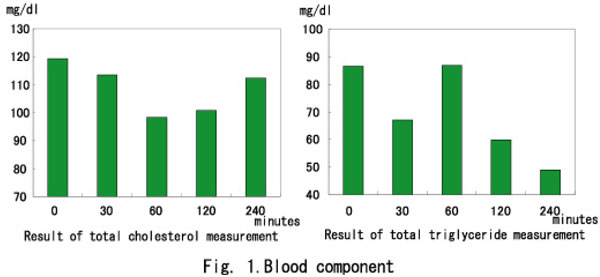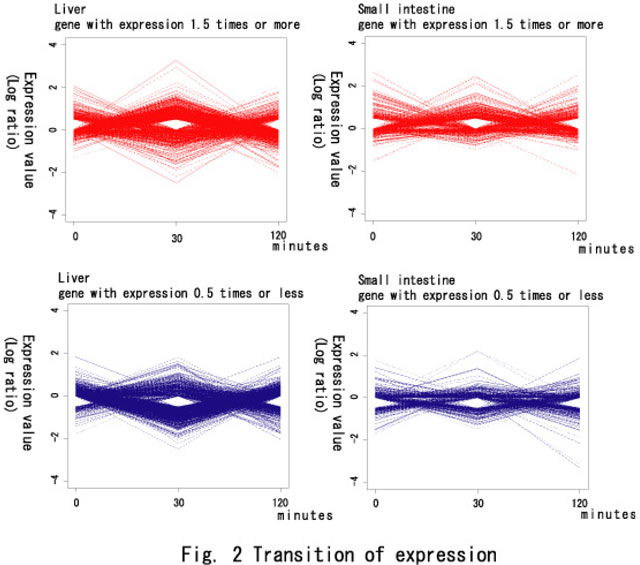- TOP
- List of reports
- Short-term Effects of Chlorella Ingestion in ICR mice
Short-term Effects of Chlorella Ingestion in ICR mice
【Scientific information】
Research and Development Department, Sun Chlorella Corporation
Short-term Effects of Chlorella Ingestion in ICR mice
Presented in Medicine and Biology, Vol. 153 No.7 (July 2009)
- Study Objectives
- Chlorella is a health food (a benefits for biological food) that has been eaten by humans for decades. Having conducted several studies on human and mice, many effects of chlorella have been reported; these include its anti-atherogenic action, dioxin excretion, and lowering of blood glucose and cholesterol levels. However, there have been no reports on the biotransformation that occurs immediately after ingesting chlorella. Hence, we evaluated the level of gene expression in mice to observe the biotransformation that occurs after ingesting a single dose of chlorella.
- Method of experiments
- We fed fasted mice with a single dose of 1000 mg/kg of chlorella, which is equivalent to a human adult ingesting 6 g. We divided the mice into the following five groups: before ingestion (0 minute), 30, 60, 120, and 240 minutes after chlorella ingestion. We evaluated the blood components of all groups and conducted a DNA microarray-based comprehensive gene expression analysis of the liver and small intestine for 3 groups: before ingestion (0 minute), 30, and 120 minutes after ingestion
- Results
- 1) Blood components
- We noted that the total cholesterol decreased until 60 minutes after chlorella ingestion, and then increased slowly until the end of the test period. Triglyceride increased until 60 minutes after chlorella ingestion, and then decreased slowly until the end of the test period. These findings suggest that lipid metabolism is activated by chlorella ingestion, and over time, it returns to the level it was at before ingesting chlorella. (Fig. 1)
- 2) Comprehensive gene expression analysis using DNA microarray
- Using DNA microarray analysis, we extracted genes that indicated 1.5- or 0.5-times higher expression in all groups at 30 or 120 minutes after ingestion, compared to before ingestion (0 minute). This suggests that the expression levels of many gene clusters were increased or controlled 30 minutes after chlorella ingestion, and returned to their original state within 120 minutes of chlorella ingestion (Fig. 2). We therefore conducted a pathway analysis to find out which metabolism changed as a result of chlorella ingestion. We noted that the lipid metabolism pathway showed significant changes in the liver and small intestine.
- From this analysis, we noted that the cholesterol metabolic pathway is activated immediately after ingesting chlorella, and the lipid in blood rapidly decreases. In addition, the result of DNA microarray analysis suggested that this biotransformation is not a consecutive effect, but it returns to its former 3-2 condition immediately after biotransformation.


Publication
- Journal:
- Medicine and Biology Vol. 153 No.7 262-272 2009
- Title:
- Short-term Effects of Chlorella Ingestion in ICR mice
- Author:
- Masaki Fujishima, Yukari Arakawa, Toru Mizoguchi
- Affiliation:
- Sun Chlorella Corporation





